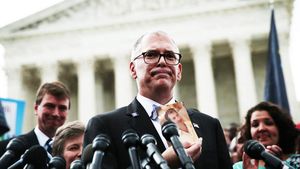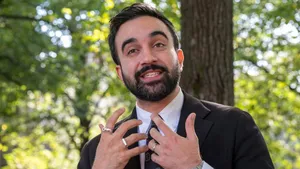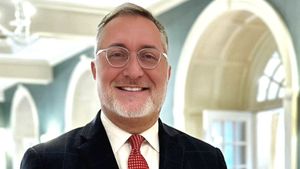Treatment GuideJust DiagnosedSex & DatingAfrican AmericanStigmaAsk the HIV DocPrEP En EspañolNewsVoicesPrint IssueVideoOut 100
CONTACTCAREER OPPORTUNITIESADVERTISE WITH USPRIVACY POLICYPRIVACY PREFERENCESTERMS OF USELEGAL NOTICE
© 2025 Pride Publishing Inc.
All Rights reserved
All Rights reserved
By continuing to use our site, you agree to our Privacy Policy and Terms of Use.
While doctors and aid organizations scramble to cope with the immediate needs of those severely injured by Haiti's devastating earthquake, longer-term public-health problems will likely remain.
Warren Johnson, an infectious-disease specialist at Weill-Cornell Medical College in New York, serves on the board of Gheskio, an AIDS treatment center based out of Port-au-Prince. Both of the center's two main facilities sustained severe damage in the quake, he says. With roads nearly impassable, Gheskio patients with HIV diesease and TB may not be able to get their medicine, he fears.
"We treat 500 people with tuberculosis at Gheskio," says Johnson. "Most of them also have AIDS. Now they don't have food, they don't have water, they don't have TB medications."
Doctors Without Borders runs three health care facilities in Port-au-Prince; all now are out of commission. The international humanitarian agency is treating patients in temporary outdoor areas, but the "best we can offer is first-aid care and stabilization," says its Haiti project manager.
From our Sponsors
Most Popular
BREAKING: Supreme Court rules to save free access to preventive care, including PrEP
June 27 2025 10:32 AM
Thanks to U=U, HIV-positive people can live long, happy, healthy lives
July 25 2025 2:37 PM
The Talk: Beyond the exam room
August 13 2025 3:15 PM
Plus: Featured Video
Latest Stories
Amazing People of 2025: Javier Muñoz
October 17 2025 7:35 PM
It’s National PrEP Day! Learn the latest about HIV prevention
October 10 2025 9:00 AM
“I am the steward of my ship”: John Gibson rewrites his HIV narrative
September 16 2025 2:56 PM
“So much life to live”: Eric Nieves on thriving with HIV
September 03 2025 11:37 AM
The Talk: Owning your voice
August 25 2025 8:16 PM
The lab coat just got queer
August 21 2025 10:00 AM
Messenger RNA could be the key to an HIV vaccine — but government cuts pose a threat
August 20 2025 8:02 AM
The Talk: Navigating your treatment
August 01 2025 6:02 PM
The Talk: Starting the conversation
July 25 2025 4:47 PM
How the Black AIDS Institute continues to fill in the gaps
July 25 2025 1:06 PM
“I felt like a butterfly”: Niko Flowers on reclaiming life with HIV
July 23 2025 12:22 PM
Dancer. Healer. Survivor. DéShaun Armbrister is all of the above
July 02 2025 8:23 PM
1985: the year the AIDS crisis finally broke through the silence
June 26 2025 11:24 AM
VIDEO: A man living with HIV discusses his journey to fatherhood
June 10 2025 4:58 PM
Trump admin guts $258 million in funding for HIV vaccine research
June 03 2025 3:47 PM
Grindr is reminding us why jockstraps are so sexy and iconic
May 02 2025 5:36 PM
HRC holds 'die-in' to protest Trump health care cuts
April 28 2025 2:11 PM
Two right-wing Supreme Court justices signal they may uphold access to PrEP and more
April 21 2025 4:10 PM


































































